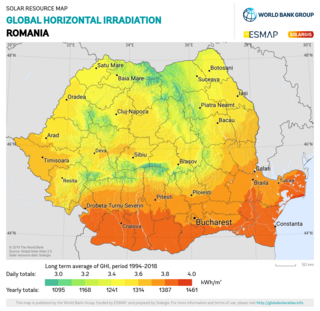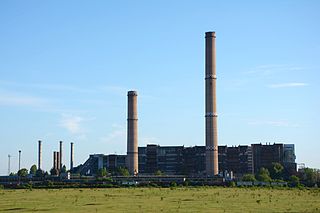Related Research Articles

The Nuclear Power Plant in Cernavodă is the only nuclear power plant in Romania. It produces around 20% of the country's electricity. It uses CANDU reactor technology from AECL, using heavy water produced at Drobeta-Turnu Severin as its neutron moderator and as its coolant agent. The Danube water is not used for cooling of the active zone.

The Mintia-Deva Power Plant was Romania's third largest thermal power plant having 5 identical groups of 210 MW each and one of 235 MW thus totalling a capacity of 1285 MW. The primary fuel was Bituminous coal mixed with Natural gas.
Ruieni Hydro Power Plant is a large power plant on the Sebeş River situated in Romania.

The Turceni Power Station is situated in Gorj County, on the banks of the Jiu River, halfway between the cities of Craiova and Târgu Jiu.
The Paroșeni Power Station is a large electricity producer and one of the largest thermal power plants in Romania with one unit and an installed capacity of 150 MW. The powerplant used to have 3 more units of 50 MW each but they were decommissioned.

The Rovinari Power Station is one of the largest electricity producers in Romania, operating with two units and one mothballed of 330 MW each thus totaling an installed capacity of 990 MW.

Wind power in Romania has total cumulative installed capacity of 3,028 MW as of the end of 2016, up from the 14 MW installed capacity in 2009.
Romania is the 38th largest energy consumer in the world and the largest in South Eastern Europe as well as an important producer of natural gas, oil and coal in Europe.
The Petrom Brazi Power Station is one of the largest electricity producers in Romania, having 2 natural gas-fired groups of 430 MW each, totalling an installed capacity of 860 MW and an electricity generation capacity of around 6 TWh/year.

The Bucharest West Power Station is a large thermal power plant located in Bucharest having 5 generation groups, 4 of 40 MW each commissioned in 1955, and one group of 190 MW commissioned in 2007 having a total electricity generation capacity of 310 MW.
The Iernut Power Station is a thermal power plant located in Iernut, Mureș County having 2 generation groups, one of 100 MW and one groups of 200, having a total electricity generation capacity of 300 MW.
The Brăila Power Station was a large thermal power plant located in Brăila, with 8 generation groups, 2 of 3 MW, 2 of 210 MW, 2 of 25 MW, 1 of 50 MW and 1 of 330 MW totaling electricity installed capacity of 856 MW. Its two chimneys are 250 metres and 200 metres tall.
The Fântânele Power Station is a large thermal power plant located in Mureș County having 5 generation groups of 50 MW having a total electricity generation capacity of 250 MW.

Solar power in Romania had an installed capacity of 1,374 megawatt (MW) as of the end of 2017. The country had in 2007 an installed capacity of 0.30 MW, which increased to 3.5 MW by the end of 2011, and to 6.5 MW by the end of 2012. However, the record year of 2013 was an exception, and new installation fell back from 1,100 MW to a moderate level of 69 MW in 2014.
Dumitra Hydro Power Plant is a run-of-the-river hydropower plant under construction on the Jiu River in Romania, with an installed capacity of 24.5 MW.

The Oradea Power Station is a large thermal power plant located in Oradea, having 5 generation groups, 4 of 50 MW each and one of 5 MW resulting a total electricity generation capacity of 205 MW.
The Doiceşti Power Station was a large thermal power plant located in Doicești, with 7 generation groups, 6 of 20 MW each and 2 of 200 MW resulting a total electricity generation capacity of 520 MW. It used Lignite as main fuel supplemented by Natural gas.
The Crivina Power Station was a large thermal power plant located in Crivina, near Anina in Caraș-Severin County. It had three generating units of 330 MW each, altogether having a total electricity generating capacity of 990 MW. It was intended to be the first oil shale power station built in Romania. The total cost of the oil shale power plant was around US$1 billion. The Crivina Power Station was supplied with 4 million tonnes of oil shale per year from the nearby Anina Mine.
Under its commitment to the EU renewable energy directive of 2009, France has a target of producing 23% of its total energy needs from renewable energy by 2020. This figure breaks down to renewable energy providing 33% of energy used in the heating and cooling sector, 27% of the electricity sector and 10.5% in the transport sector. By the end of 2014, 14.3% of France's total energy requirements came from renewable energy, a rise from 9.6% in 2005.
References
- ↑ "Alum Tulcea Power Plant" (in Romanian). ro.trapec.ro. 2007. Retrieved 2009-06-11.[ permanent dead link ]
- ↑ "Ruşii de la Vimetco au ales dezvoltatorul proiectului termocentralei de la Tulcea cu o valoare estimată de 300 mil. euro" (in Romanian). Ziarul Financiar. 2011-12-28. Retrieved 2011-12-28.